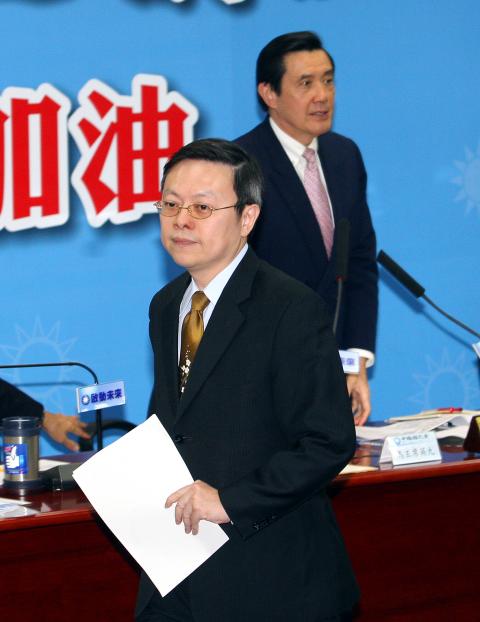Chinese President Xi Jinping’s (習近平) comments that suggested using the longstanding Beijing cross-strait initiative of “one country, two systems (一國兩制)” in dealing with Taiwan violated mainstream public opinion in the nation and will not be accepted as an option in cross-strait relations, the Democratic Progressive Party (DPP) said yesterday.
In Xi’s meeting with former vice president Lien Chan (連戰) in Beijing on Tuesday, Xi was quoted by state-owned Xinhua news agency as saying that China “respects the social system and lifestyle that Taiwanese compatriots have chosen” and it “completely understands how Taiwan compatriots feel.”
However, “family affection will help heal past wounds” and Beijing has “patience and confidence” that the existing problems would be solved, Xi was quoted as saying in the meeting with Lien, who is scheduled to conclude his four-day visit today.

Photo: CNA
The Chinese president reiterated that “it has never changed, and will never change, that we belong to one nation.”
“Xi was basically again proposing ‘one country, two systems,’ but the majority of Taiwanese do not accept it,” the DPP’s Policy Research Committee executive director Joseph Wu (吳釗燮) told a press conference.
The mainstream public opinion in Taiwan as well as the DPP’s view are clear, as various polls have showed, that people see Taiwan as an independent and sovereign country without subordination, and any change to the “status quo” would require the consent of the 23 million Taiwanese, Wu said.
Wu said that China has not only tried to undermine relations between the Chinese Nationalist Party (KMT) and the DPP, but also the KMT’s internal relations. For example, Beijing received Lien, a former KMT chairman, with higher-level protocol than it did Mainland Affairs Council (MAC) Minister Wang Yu-chi (王郁琦), who as a representative of President Ma Ying-jeou (馬英九) met with his Chinese counterpart last week in Nanjing for the first governmental meeting between the two sides in 65 years, he said.
“It’s clear that Lien no longer represents Ma. I would say that Beijing is trying to exploit the strained relations between Lien and Ma to its advantage. To me, it did not look like Lien was trying to create an opportunity for a proposed Ma-Xi meeting,” Wu said.
Responding to the issue before the party’s weekly Central Standing Committee meeting, DPP Chairman Su Tseng-chang (蘇貞昌) said Lien’s view was his own and represented neither the KMT administration’s official position nor the opinion of Taiwanese.
The MAC responded to the Lien-Xi meeting in a press release yesterday, reiterating the Ma administration’s insistence that cross-strait relations would be promoted based on the foundation of “the [so-called] ‘1992 consensus’ and ‘one China with different interpretations (一中各表)’ initiative” and that the “status quo” would be maintained with “no unification, no independence and no use of force.”
The ministry called on Beijing to face reality so that bilateral relations could be further developed with mutual trust.
Taiwan Solidarity Union (TSU) Chairman Huang Kun-huei (黃昆輝) lambasted Lien for saying that cross-strait relations are not international relations, saying Lien had betrayed the people of Taiwan in exchange for benefits to himself and his family.

Chinese Nationalist Party (KMT) Chairman Eric Chu (朱立倫), spokeswoman Yang Chih-yu (楊智伃) and Legislator Hsieh Lung-chieh (謝龍介) would be summoned by police for questioning for leading an illegal assembly on Thursday evening last week, Minister of the Interior Liu Shyh-fang (劉世芳) said today. The three KMT officials led an assembly outside the Taipei City Prosecutors’ Office, a restricted area where public assembly is not allowed, protesting the questioning of several KMT staff and searches of KMT headquarters and offices in a recall petition forgery case. Chu, Yang and Hsieh are all suspected of contravening the Assembly and Parade Act (集會遊行法) by holding

PRAISE: Japanese visitor Takashi Kubota said the Taiwanese temple architecture images showcased in the AI Art Gallery were the most impressive displays he saw Taiwan does not have an official pavilion at the World Expo in Osaka, Japan, because of its diplomatic predicament, but the government-backed Tech World pavilion is drawing interest with its unique recreations of works by Taiwanese artists. The pavilion features an artificial intelligence (AI)-based art gallery showcasing works of famous Taiwanese artists from the Japanese colonial period using innovative technologies. Among its main simulated displays are Eastern gouache paintings by Chen Chin (陳進), Lin Yu-shan (林玉山) and Kuo Hsueh-hu (郭雪湖), who were the three young Taiwanese painters selected for the East Asian Painting exhibition in 1927. Gouache is a water-based

Taiwan would welcome the return of Honduras as a diplomatic ally if its next president decides to make such a move, Minister of Foreign Affairs Lin Chia-lung (林佳龍) said yesterday. “Of course, we would welcome Honduras if they want to restore diplomatic ties with Taiwan after their elections,” Lin said at a meeting of the legislature’s Foreign Affairs and National Defense Committee, when asked to comment on statements made by two of the three Honduran presidential candidates during the presidential campaign in the Central American country. Taiwan is paying close attention to the region as a whole in the wake of a

OFF-TARGET: More than 30,000 participants were expected to take part in the Games next month, but only 6,550 foreign and 19,400 Taiwanese athletes have registered Taipei city councilors yesterday blasted the organizers of next month’s World Masters Games over sudden timetable and venue changes, which they said have caused thousands of participants to back out of the international sporting event, among other organizational issues. They also cited visa delays and political interference by China as reasons many foreign athletes are requesting refunds for the event, to be held from May 17 to 30. Jointly organized by the Taipei and New Taipei City governments, the games have been rocked by numerous controversies since preparations began in 2020. Taipei City Councilor Lin Yen-feng (林延鳳) said yesterday that new measures by